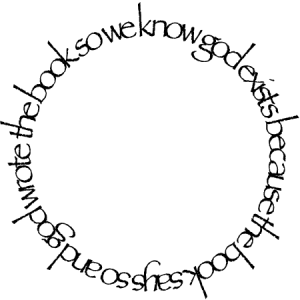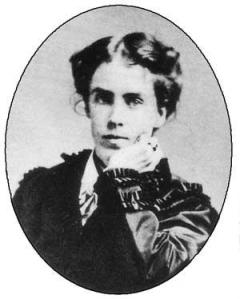Or less…
I gave short shrift to the pre-Socratics, but Democritus (c.460-360 BCE) was a genuine visionary. He “developed a picture of the world that is remarkably close to our current scientific views.” He never appeared in public without laughing at human folly, hence his moniker “The Laughing Philosopher.” (Looks a little grim here, the sculptor may have been unsympathetic.) He had the last laugh, if it’s true that he lived past 100. He had good atoms.
world that is remarkably close to our current scientific views.” He never appeared in public without laughing at human folly, hence his moniker “The Laughing Philosopher.” (Looks a little grim here, the sculptor may have been unsympathetic.) He had the last laugh, if it’s true that he lived past 100. He had good atoms.
“With Democritus the attempt to deanimate and demythologize the world was complete.” His “soul” was insubstantial except when embodied, and then was more like a breath than a spirit. “I would rather understand one cause,” he said, “than be King of Persia.” Carl Sagan celebrated him on Cosmos.
Many of Democritus’ successors developed views remarkably inimical to current scientific wisdom.
 Rene Descartes (1596-1650) thought it useful to doubt the reality of everything; he was a mind-body dualist; and he demanded indubitable certainty as the gold-standard of scientific knowledge. All of these views have been doubted, if not flatly rejected, by most scientifically-minded moderns. His famed Meditations seem circular. (Here he is, squashed and truncated.)
Rene Descartes (1596-1650) thought it useful to doubt the reality of everything; he was a mind-body dualist; and he demanded indubitable certainty as the gold-standard of scientific knowledge. All of these views have been doubted, if not flatly rejected, by most scientifically-minded moderns. His famed Meditations seem circular. (Here he is, squashed and truncated.)
Baruch Spinoza (1632-1677) thought everything was part of one universal reality (or metaphysical substance). He was a pantheist. We’ve noted that Einstein was a fan: “I believe in Spinoza’s God, who reveals himself in the lawful harmony of all that exists, but not in a God who concerns himself with the fate and the doings of mankind.” It may well be that “Spinoza’s God” continues to capture more scientific respect than any more traditional alternative.
Gottfried Wilhelm von Leibniz (1646-1716), aka “Dr. Pangloss” in Candide, thought reality was almost infinitely various, but also boxed and sealed. We are “monads,” self-contained substances (not unlike Neo, pre-Morpheus) experiencing a pre-arranged harmony
 of perceptions orchestrated by a very controlling Master Monad. We have “no windows.”
of perceptions orchestrated by a very controlling Master Monad. We have “no windows.”
George Berkeley (1685-1753) said esse est percipi, “to be is to be perceived.” Don’t blink, God, or we’ll wink out of existence. The lexicographer and wit Samuel Johnson thought he had a practical refutation of Berkeley’s idealism. He missed the point, but made one too: your philosophy of reality really ought to make a discernible difference in your experience of life .
Immanuel Kant (1724-1804) said “things in themselves” (tits, as I’m afraid my undergraduate Kant professor taught me to abbreviate them) are out of reach. We deal strictly in phenomena, or appearances. But the good news for Kant is that we can be sure that appearances are not deceptive in at least one crucial respect: they appear as they must, in the light of our own categorical nature. We constitute the world through the categories our collective minds impose upon them, and thus are normally in touch with reality when we ply our minds and use our reason.
G.W.F. Hegel (1770-1831) saw the world as a kind of universal Spirit, coming to maturity through the clash and conflicts of human history. He was the ultimate Systematic philosopher and devotee of Rationality, the antithesis of Kierkegaard (though some scholars have begun to challenge this). He made Schopenhauer crazy.
 Karl Marx (1818-1883) “turned Hegel on his head,” seeing the world mainly in material terms. History was for him, as for Hegel, a grand unfolding process (“dialectic”) tending toward some higher “synthesis” that would represent our apotheosis as a species. But as we know, his particular political synthesis has met with some resistance in recent decades.
Karl Marx (1818-1883) “turned Hegel on his head,” seeing the world mainly in material terms. History was for him, as for Hegel, a grand unfolding process (“dialectic”) tending toward some higher “synthesis” that would represent our apotheosis as a species. But as we know, his particular political synthesis has met with some resistance in recent decades.
Arthur Schopenhauer (1788-1860)– separated at birth from Ebenezer Scrooge– was the pessimist-par excellence: life (on his view) is no good, without purpose, the clatter of pointless striving will. But he wasn’t a total scrooge: he loved little dogs, and (as we’ll see) as a young man he loved at least one or two other human beings. That’s why Alain de Botton chooses him to exemplify “consolation for a broken heart.”

 “Imagine that you are taking upon yourself, in the form of a gray cloud, the disease, confusion, and mental toxins of [suffering] people, which disappears into the white light of your heart without leaving any trace. This will transform both your own suffering and that of others… “
“Imagine that you are taking upon yourself, in the form of a gray cloud, the disease, confusion, and mental toxins of [suffering] people, which disappears into the white light of your heart without leaving any trace. This will transform both your own suffering and that of others… “
 the death of a loved one, a rollicking earthquake, a brush with your mortality… all such experiences may give rise to feelings you can’t articulate but also can’t ignore. “There are occasional moments,” wrote James’s student and biographer R.B. Perry, “when experience is most fully tasted—in the exhilaration of a fresh morning, in moments of suffering, or in times of triumphant effort, when the tang is strong, when every nuance or overtone is present. James would arrest us at such moments, and say, “There, that is it. Reality is like that.” There’s no formula, no E=mc2, to encapsulate those moments. But they’re very real.
the death of a loved one, a rollicking earthquake, a brush with your mortality… all such experiences may give rise to feelings you can’t articulate but also can’t ignore. “There are occasional moments,” wrote James’s student and biographer R.B. Perry, “when experience is most fully tasted—in the exhilaration of a fresh morning, in moments of suffering, or in times of triumphant effort, when the tang is strong, when every nuance or overtone is present. James would arrest us at such moments, and say, “There, that is it. Reality is like that.” There’s no formula, no E=mc2, to encapsulate those moments. But they’re very real. Plato had some wild ideas about reality. Aristotle was more grounded. (Recall your art history.) Two worlds or one? Are essences (Forms, Ideas) here or there? Are we in a cave, or in the light?
Plato had some wild ideas about reality. Aristotle was more grounded. (Recall your art history.) Two worlds or one? Are essences (Forms, Ideas) here or there? Are we in a cave, or in the light? 

 First, he seemed to endorse a “backlash” he had observed against the late, great Fred Rogers. “That’s just wrong!” I heard myself blurting. And it is. Mr. Rogers gets a lot of unwarranted criticism, mostly from the right, for allegedly padding kids’ self-esteem without a corresponding insistence that they earn it. Don’t tell them they are uniquely special, we heard, unless you also spell out the counter-vailing message that they all are “uniquely ordinary.”
First, he seemed to endorse a “backlash” he had observed against the late, great Fred Rogers. “That’s just wrong!” I heard myself blurting. And it is. Mr. Rogers gets a lot of unwarranted criticism, mostly from the right, for allegedly padding kids’ self-esteem without a corresponding insistence that they earn it. Don’t tell them they are uniquely special, we heard, unless you also spell out the counter-vailing message that they all are “uniquely ordinary.”
 “Today I about touched bottom, and perceive plainly that I must face the choice with open eyes: shall I frankly throw the moral business overboard… or shall I follow it, and it alone, making everything else merely stuff for it?”
“Today I about touched bottom, and perceive plainly that I must face the choice with open eyes: shall I frankly throw the moral business overboard… or shall I follow it, and it alone, making everything else merely stuff for it?” Minnie Temple,* at age 23.
Minnie Temple,* at age 23. But I also note that some advocates of renunciation are quite frank: it means “losing interest in life’s activities… letting go of all desires and attachments… turning inward instead of constantly being focused outward.” This is the diametrical contradiction of Russell’s advice in
But I also note that some advocates of renunciation are quite frank: it means “losing interest in life’s activities… letting go of all desires and attachments… turning inward instead of constantly being focused outward.” This is the diametrical contradiction of Russell’s advice in  personal taint.” Taint?!
personal taint.” Taint?! This is one of the nubs of the issue, for me. Personal values, predilections, enthusiasms, interests, idiosyncracies, peccadillos… these are our delights. For us to abandon them for the rational, impersonal, categorical (etc.) out of a sense of duty to the Moral Law and Reason for its own sake, is not to pursue happiness, it’s to denigrate happiness as peripheral to more important things (to be ascertained by always supposing that our choices must legislate for all, imperatively, impersonally, and categorically). Kantians can help us remember not to denigrate the common world, and bless them for that. But if happiness is not, at the end of the day, about personal satisfactions and my individual flourishing (and yours), I say it’s over-rated. It is, though. So it isn’t. Critique that, Immanuel.
This is one of the nubs of the issue, for me. Personal values, predilections, enthusiasms, interests, idiosyncracies, peccadillos… these are our delights. For us to abandon them for the rational, impersonal, categorical (etc.) out of a sense of duty to the Moral Law and Reason for its own sake, is not to pursue happiness, it’s to denigrate happiness as peripheral to more important things (to be ascertained by always supposing that our choices must legislate for all, imperatively, impersonally, and categorically). Kantians can help us remember not to denigrate the common world, and bless them for that. But if happiness is not, at the end of the day, about personal satisfactions and my individual flourishing (and yours), I say it’s over-rated. It is, though. So it isn’t. Critique that, Immanuel. In fairness, Sartre is expressing the state of mind of the pre-Existentialist hero who has yet to take full personal responsibility for creating his own essence, when he says “we hadn’t the slightest reason to be [here].” He’s quite clear, in E
In fairness, Sartre is expressing the state of mind of the pre-Existentialist hero who has yet to take full personal responsibility for creating his own essence, when he says “we hadn’t the slightest reason to be [here].” He’s quite clear, in E


 Where are our Voltaires, spotlighting the suffering wrought by natural phenomena (Katrina, quakes, tsunamis,
Where are our Voltaires, spotlighting the suffering wrought by natural phenomena (Katrina, quakes, tsunamis,  I renounce the higher harmony altogether. It’s not worth the tears of that one tortured child who beat itself on the breast with its little fist and prayed… to ‘dear, kind God’! It’s not worth it, because those tears are unatoned for. They must be atoned for, or there can be no harmony.”
I renounce the higher harmony altogether. It’s not worth the tears of that one tortured child who beat itself on the breast with its little fist and prayed… to ‘dear, kind God’! It’s not worth it, because those tears are unatoned for. They must be atoned for, or there can be no harmony.” can, because it is fleeting. The idea that this life is all there is should not be an occasion for despair and despondency. It should be a source of joy and dreams—joy of living for the moment, and dreams of trying to make the world a better place… This means working to alleviate suffering.”
can, because it is fleeting. The idea that this life is all there is should not be an occasion for despair and despondency. It should be a source of joy and dreams—joy of living for the moment, and dreams of trying to make the world a better place… This means working to alleviate suffering.” There is a closed door, behind which is the management, but the management never comes out. You get to speculate what the management must be like. Can you infer from the dormitory as you find it that the management, first, knows… …exactly what conditions are like, second, cares intensely for your welfare, and third, possesses unlimited resources for fixing things? The inference is crazy. You would be almost certain to infer that either the management doesn’t know, doesn’t care, or cannot do anything about it. Nor does it make things any better if occasionally you come across a student who declaims that he has become privy to the mind of the management, and is assured that the management indeed knows, cares, and has resources and ability to do what it wants. The overwhelming inference is not that the management is like that, but that this student is deluded. Perhaps his very deprivations have deluded him.” Simon Blackburn,
There is a closed door, behind which is the management, but the management never comes out. You get to speculate what the management must be like. Can you infer from the dormitory as you find it that the management, first, knows… …exactly what conditions are like, second, cares intensely for your welfare, and third, possesses unlimited resources for fixing things? The inference is crazy. You would be almost certain to infer that either the management doesn’t know, doesn’t care, or cannot do anything about it. Nor does it make things any better if occasionally you come across a student who declaims that he has become privy to the mind of the management, and is assured that the management indeed knows, cares, and has resources and ability to do what it wants. The overwhelming inference is not that the management is like that, but that this student is deluded. Perhaps his very deprivations have deluded him.” Simon Blackburn, 
 But that’s another story, another song. If you’re interested, check out chapter four in
But that’s another story, another song. If you’re interested, check out chapter four in